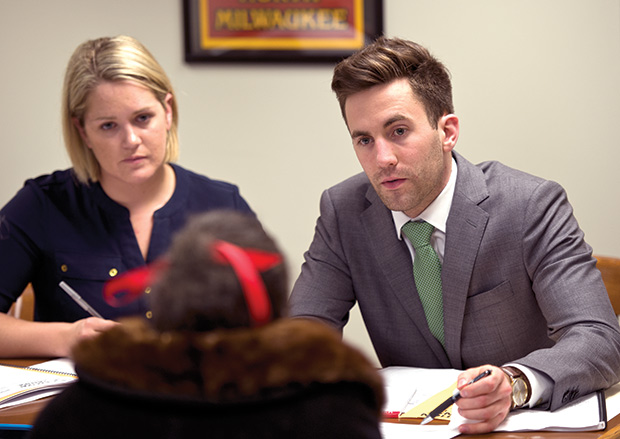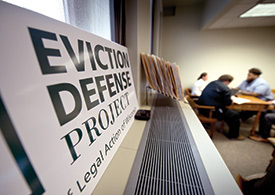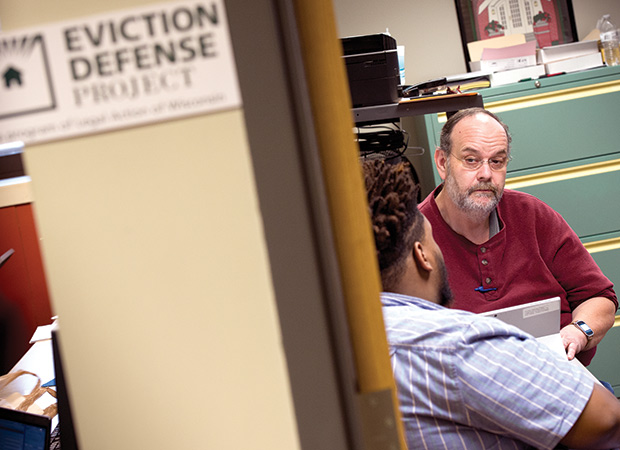Federal budget proposal would deal blow to civil legal aid groups, pro bono program
By: Erika Strebel, [email protected]//May 3, 2017//
Federal budget proposal would deal blow to civil legal aid groups, pro bono program
By: Erika Strebel, [email protected]//May 3, 2017//

Although President Donald Trump has struggled to deliver on many of his campaign promises in his first 100 days in office, legal-aid advocates are still worried about a budget proposal that could leave thousands of residents who can’t afford legal representation fending for themselves.
Of the 17 government agencies that Trump called for eliminating in a budget proposal he released in March, legal professionals are perhaps most concerned about Legal Services Corp. The organization pays for civil-legal aid for clients with low incomes and distributes about 90 percent of its money to independent nonprofit legal aid programs throughout the country.

The president’s proposed elimination of the LSC would hit two legal-aid organizations in Wisconsin: Wausau-based Wisconsin Judicare and Milwaukee-based Legal Action of Wisconsin. Both receive about $5 million from the LSC, money they use to provide not only legal services but also run programs that train private attorneys to provide pro bono legal services.
Kimberly Haas, Judicare executive director, and David Pifer, Legal Action executive director, noted that the two organizations are the only ones in Wisconsin to receive money from the LSC. That makes them responsible for helping people living not just in their immediate areas but also throughout the state.
“It’s important to understand that because of these funds, we are able to reach every single county in Wisconsin and not just localize those into larger cities and counties,” Haas said. “To lose them would mean not just fewer people getting services but fewer people getting services in counties that have few services to begin with.”
“As a practical matter, as soon as you stepped outside of Milwaukee, there would be no free legal aid for poor people,” Pifer said. “Even in Milwaukee, the only source would be Legal Aid, but they have limited resources.”
The elimination of the LSC would most likely have different consequences for each group. Judicare, which serves 33 of Wisconsin’s 72 counties and the state’s 11 federally recognized Native American tribes, would probably shut down. Legal Action, which serves the remaining 39 counties and has offices in La Crosse, Green Bay, Oshkosh, Milwaukee, Racine and Madison, would still be able to offer services, just fewer than before.
With 12 lawyers on its staff, Judicare can take on cases without relying on outside help. Still, its more common practice is to connect clients with a local private attorney. Haas said Judicare receives more than 4,500 applications a year. In 2015, it took on nearly 1,400 cases.
A full 51 percent of Judicare’s annual budgets come from the LSC. Were that money to go away, there would not be enough left over to continue operating, Haas said. She noted that some of the other money Judicare receives — from other federal agencies, Indian tribes and local organizations like the United Way of Marathon County — depends on the organization’s ability to get matching contributions from the LSC.
“We do have other funding sources, but even those together won’t be enough to keep our doors open,” Haas said. “And even if we were able to keep our doors open, we wouldn’t be able to serve near the number we currently serve.”
Legal Action, in contrast, would be able to get by without LSC money. To be sure, The LSC is the source of a substantial part — about 48 percent — of Legal Action’s annual $10 million budget. But the organization has enough independent grants and contracts to keep going, Pifer said.
The worst consequence would be the need to close offices and cut back services. Legal Action worked on more than 11,000 cases in 2015. Pifer projects the loss of LSC money would reduce it to taking on fewer than half of those cases in future years.
Like Judicare, Legal Action uses LSC money to leverage funding from other sources, such as grants offered through the federal Victims of Crime Act.
Pifer said Legal Action might also find itself having to alter its mission, noting that many grants come with strings attached mandating that the money be spent to help specific groups of people.
Were Trump’s budget proposal approved and Legal Action still managed to keep its Racine office open, for instance, the organization would most likely find itself limited by grant stipulations to offering legal aid in that area only to impoverished victims of crime.
For similar reasons, the Milwaukee office would have to rely heavily on money received through the federal Older Americans Act, as well as the Milwaukee County Department on Aging. The result could be a greater emphasis on helping seniors, possibly to the exclusion of other groups. Likewise, victims of domestic violence could continue to be represented through the Milwaukee office’s work with the Sojourner Family Peace Center.

Still, Pifer said, “We would no longer be able to provide eviction representation. We would no longer be able to provide much of the public benefits work we do.”
One service that would almost certainly be on the chopping block: The Volunteer Lawyers Project, which is the largest project of its sort in Wisconsin to offer pro bono legal services.
“Private lawyers give time to provide a wide range of representation, from evictions to domestic violence injunctions to consumer problems to unemployment compensation issues,” Pifer said. “All of that would simply be gone.”
Yet, even as people like Haas and Pifer express anxieties about the future, others console themselves with reminders that presidents’ budget proposals are almost always little more than a way of listing priorities. The real starting point for federal spending plans instead tends to be Congress.
No matter what happens, Haas and Pifer say they are undeterred.
“We can’t stop helping folks and collect money and go into hibernation — that doesn’t help anybody,” Haas said. “We are continuing to fill positions that are open in order to provide the best services we can.”
Legal News
- 12-year-old shot in Milwaukee Wednesday with ‘serious injuries’
- Giuliani, Meadows among 18 indicted in Arizona fake electors case
- Some State Bar diversity participants walk away from program
- Wisconsin court issues arrest warrant ‘in error’ for Minocqua Brewing owner
- Iranian nationals charged cyber campaign targeting U.S. Companies
- Facing mostly white juries, are Milwaukee County defendants of color truly judged by their peers?
- Milwaukee Mayor speaks in D.C. Tuesday at White House water summit
- Chicago man sentenced to prison after being caught with ‘Trump Gun’
- FTC bans non-competes
- Gov. Evers seeks applicants for Dane County Circuit Court
- Milwaukee man charged in dismemberment death pleads not guilty
- Democratic-led states lead ban on the book ban
WLJ People
- Power 30 Personal Injury Attorneys – Russell Nicolet
- Power 30 Personal Injury Attorneys – Benjamin Nicolet
- Power 30 Personal Injury Attorneys – Dustin T. Woehl
- Power 30 Personal Injury Attorneys – Katherine Metzger
- Power 30 Personal Injury Attorneys – Joseph Ryan
- Power 30 Personal Injury Attorneys – James M. Ryan
- Power 30 Personal Injury Attorneys – Dana Wachs
- Power 30 Personal Injury Attorneys – Mark L. Thomsen
- Power 30 Personal Injury Attorneys – Matthew Lein
- Power 30 Personal Injury Attorneys – Jeffrey A. Pitman
- Power 30 Personal Injury Attorneys – William Pemberton
- Power 30 Personal Injury Attorneys – Howard S. Sicula











